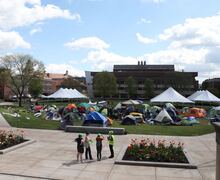Film sparks conflict on radical Islam
Syracuse University’s College Republicans will show a controversial film on Islam tonight at 7 in the Hall of Languages Room 207.
The 2006 movie, directed by Raphael Shore, is ‘Obsession: Radical Islam’s War Against the West.’ The debate surrounding it stems from its focus on radical Islamic viewpoints. Some Muslims on campus said they do not agree with the showing of the movie at the university, claiming it is biased and unfair. But supporters of the film say it is a balanced and fair documentary based on the opinions of people who have experienced the Islamic religion firsthand.
Shore’s nonprofit organization, Clarion Fund, distributed more than 28 million copies around the country during the last month. DVDs were sent to churches and synagogues, and as newspaper advertising supplements in swing states.
‘There is a need today to promote awareness against radical Islam,’ said Dan Fitzpatrick, executive director of the College Republicans at SU and political science major.
The movie will be played during the ‘Islamo-Fascism Awareness Week,’ an event observed by some conservative groups nationwide.
‘Moderate Muslims need to speak out against radical Islam and be the vocal element of the Muslim world,’ Fitzpatrick said.
Fitzpatrick insisted the film clearly starts with the statement that ‘it is talking about radical Islam, and that most Muslims are not extremists.’
The movie makes a point that moderate Muslims don’t speak out because they live in fear, said Mark Lucaj, a sophomore computer science major and a member of the College Republicans.
When members of SU’s Muslim Students Association heard the College Republicans would be showing the film, they asked for the opportunity to tell their side of the story before the screening, said Ahmed Al-Salem, a sophomore in the School of Information Studies and president of MSA.
Al-Salem said he was angered and disappointed when he first watched the film last week. He said the movie has no credibility and questioned the credentials of the film’s main sources.
‘Throughout the movie there were nine speakers,’ Al-Salem said. ‘Out of the nine, seven were Christians or Zionists. There were only two Muslims speakers, and only one of them with a degree in Islamic Studies.’
Yusuf Abdul-Qadir, a senior political science and Middle Eastern studies major and a member of MSA, will also speak before the film is shown. Abdul-Qadir said the movie is characterized by anti-Muslim stereotypes and the cherry-picking of inflammatory images.
The documentary brings the most polarizing and hatemongering people to speak about Islam, Abdul-Qadir said. He calls those in the film ‘the type of people that make money talking about how horrible Islam is and how everybody should be afraid of Islam.’
One person featured in the film is Walid Shoebat, who once told the Springfield News-Leader, a Missouri daily newspaper, ‘Islam is not the religion of God – Islam is the devil.’
Abdul-Qadir, who has watched the movie three times already, said it demonizes Islam and all Muslims altogether, not just radicals.
But Fitzpatrick said the movie raises awareness on the urgent threat of radical Islam. Because the mainstream media is not adequately reporting the worldwide threat of radical Islam, Fitzpatrick said, he thinks it’s important that ‘all Americans see this movie.’
‘The media has hush criticism of religion,’ Fitzpatrick said. ‘It’s kind of ridiculous to ignore such threat. We’re talking about world peace here.’
Rabbi Sheldon Ezring of the Temple Concord in Syracuse addressed similar concerns of how the Muslim community is portrayed in the United States.
‘There is a lack of trust for Muslims in this country,’ Ezring said. ‘They have major difficulties in this country, and many view Islam as a backward religion, especially with everything that’s going on over there.’
For a number of people, the Sept. 11 attacks and its aftermath exposed concerns throughout the United States about whether Islam, was compatible with American values.
More than seven years later, Ezring said a change in attitude is possible.
For progress to really happen, he said people must first become friends by inviting each other into their homes. Only then will each faith be able to recognize what the other has to offer. He said the important thing is that people talk about their respective faith openly, in an atmosphere free of intimidation.
Ezring said there’s one thing holding such a change back.
‘These things take time.’
Published on October 21, 2008 at 12:00 pm




